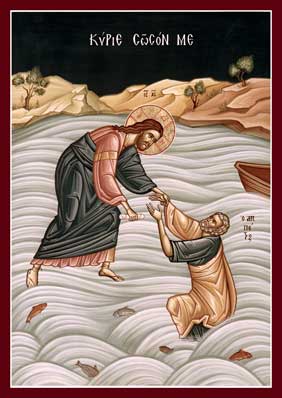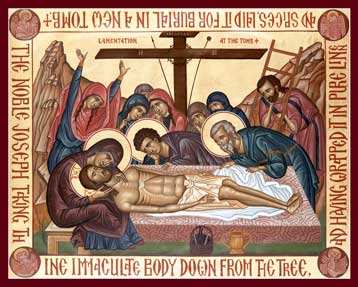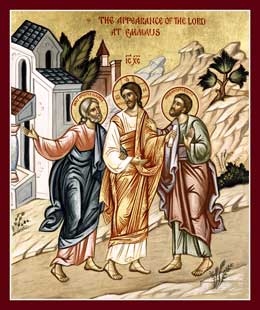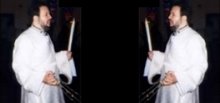
Bought a bike this week!
Went for a ride with my son.
He is much more fit...
[wheeze...]
SERMONS ON >> EVERYTHING <<
 At the risk of having mis-categorized this entry under The Orthodox Church vs. Non Sequitur, let me add that last night, we discovered another treasure: Vienna Teng in concert at the Firehouse Center for the Arts in Newburyport. The performance was intimate -- the theater seats just 195 -- and truly breathtaking. Now there are three more CDs destined for inclusion in What's on the iPod.
At the risk of having mis-categorized this entry under The Orthodox Church vs. Non Sequitur, let me add that last night, we discovered another treasure: Vienna Teng in concert at the Firehouse Center for the Arts in Newburyport. The performance was intimate -- the theater seats just 195 -- and truly breathtaking. Now there are three more CDs destined for inclusion in What's on the iPod.
 Short Trip to the Edge: Where Earth Meets Heaven--A Pilgrimage, by Scott Cairns, is the story of a university professor's quest for a spiritual life, and his subsequent journeys to the monastic republic of Mt. Athos, where he meets, among others, Fr. Iakovos of Simonos Petra. Fr. Iakovos originally hails from Winthrop, Massachusetts, and on trips home to see his family, has come to visit St. George's in Worcester. I've met him once, and he left a most indelible impression, as did Cairns's very fine book.
Short Trip to the Edge: Where Earth Meets Heaven--A Pilgrimage, by Scott Cairns, is the story of a university professor's quest for a spiritual life, and his subsequent journeys to the monastic republic of Mt. Athos, where he meets, among others, Fr. Iakovos of Simonos Petra. Fr. Iakovos originally hails from Winthrop, Massachusetts, and on trips home to see his family, has come to visit St. George's in Worcester. I've met him once, and he left a most indelible impression, as did Cairns's very fine book. A Place of Healing for the Soul: Patmos is, similarly, a travelogue of sorts, though in this case, the author, BBC journalist Peter France, is not looking for a spiritual life, but finds one courtesy of the many gifts of the Holy Island of Patmos. The connection for me, here, is that France made his first visit to Patmos at the invitation of Kallistos Ware, who was, when I was in the process of converting, one of the few Orthodox writers available in English. Metropolitan Kallistos served at St. Vladimir's Seminary some twenty years ago, at an Orthodox Education Day, and I had the joy of serving with him. (I hope I didn't make too much of a git of myself.) Apparently, he's just been back at St. Vlad's this spring.
A Place of Healing for the Soul: Patmos is, similarly, a travelogue of sorts, though in this case, the author, BBC journalist Peter France, is not looking for a spiritual life, but finds one courtesy of the many gifts of the Holy Island of Patmos. The connection for me, here, is that France made his first visit to Patmos at the invitation of Kallistos Ware, who was, when I was in the process of converting, one of the few Orthodox writers available in English. Metropolitan Kallistos served at St. Vladimir's Seminary some twenty years ago, at an Orthodox Education Day, and I had the joy of serving with him. (I hope I didn't make too much of a git of myself.) Apparently, he's just been back at St. Vlad's this spring. You've heard of The Secret -- this book that's apparently a cross between The Da Vinci Code and The Power of Positive Thinking.
You've heard of The Secret -- this book that's apparently a cross between The Da Vinci Code and The Power of Positive Thinking."Hey, aren't they awesome, just look at them -- No, wait, stop -- OH RATS!!"The problem with this is, you have some very important Fathers of the Church saying some very strange things like this:
"What are we going to do now?"
"You want me to do WHAT?"
"And then they're going to WHAT??"
"You know what's going to happen?"
"I know."
"You know what you'll have to do?"
"I know."
"You know what this will cost?"
"I know."
"And you still want to go ahead and do this?"
"I do, I do, I do."
 Next Sunday, we will celebrate the Sunday of the Cross. The two Sundays following, we will remember two great Saints: great specifically because they took up their crosses. Saint John of the Ladder, first -- because, of course, the means he describes for attaining the Kingdom of Heaven, the Ladder of Divine Ascent, is the Cross -- and then, Saint Mary of Egypt, about whom we will sing, in her troparion, "In you, O Mother, was carefully preserved what is according to the image, for you took up the Cross and followed Christ." Finally, we will come to Palm Sunday, when the Lord enters Jerusalem for no other reason than to take up His own Cross.
Next Sunday, we will celebrate the Sunday of the Cross. The two Sundays following, we will remember two great Saints: great specifically because they took up their crosses. Saint John of the Ladder, first -- because, of course, the means he describes for attaining the Kingdom of Heaven, the Ladder of Divine Ascent, is the Cross -- and then, Saint Mary of Egypt, about whom we will sing, in her troparion, "In you, O Mother, was carefully preserved what is according to the image, for you took up the Cross and followed Christ." Finally, we will come to Palm Sunday, when the Lord enters Jerusalem for no other reason than to take up His own Cross. For I delivered to you first of all that which I also received: that Christ died for our sins according to the Scriptures, and that He was buried, and that He rose again the third day according to the Scriptures, and that He was seen by Cephas, then by the twelve. After that He was seen by over five hundred brethren at once, of whom the greater part remain to the present, but some have fallen asleep. After that He was seen by James, then by all the apostles. Then last of all He was seen by me also, as by one born out of due time. (1 Corinthians 15:3-8, emphasis mine)
For I delivered to you first of all that which I also received: that Christ died for our sins according to the Scriptures, and that He was buried, and that He rose again the third day according to the Scriptures, and that He was seen by Cephas, then by the twelve. After that He was seen by over five hundred brethren at once, of whom the greater part remain to the present, but some have fallen asleep. After that He was seen by James, then by all the apostles. Then last of all He was seen by me also, as by one born out of due time. (1 Corinthians 15:3-8, emphasis mine) And I, brethren, when I came to you, did not come with excellence of speech or of wisdom declaring to you the testimony of God. For I determined not to know anything among you except Jesus Christ and Him crucified. (1 Corinthians 2:1-2, emphasis mine)
And I, brethren, when I came to you, did not come with excellence of speech or of wisdom declaring to you the testimony of God. For I determined not to know anything among you except Jesus Christ and Him crucified. (1 Corinthians 2:1-2, emphasis mine) Now behold, two of them were traveling that same day to a village called Emmaus, which was about seven miles from Jerusalem. And they talked together of all these things which had happened. So it was, while they conversed and reasoned, that Jesus Himself drew near and went with them. But their eyes were restrained, so that they did not know Him. And He said to them, "What kind of conversation is this that you have with one another as you walk and are sad?"
Now behold, two of them were traveling that same day to a village called Emmaus, which was about seven miles from Jerusalem. And they talked together of all these things which had happened. So it was, while they conversed and reasoned, that Jesus Himself drew near and went with them. But their eyes were restrained, so that they did not know Him. And He said to them, "What kind of conversation is this that you have with one another as you walk and are sad?"Then the one whose name was Cleopas answered and said to Him, "Are You the only stranger in Jerusalem, and have You not known the things which happened there in these days?"
And He said to them, "What things?"

And they said to Him, "The things concerning Jesus of Nazareth, who was a Prophet mighty in deed and word before God and all the people, and how the chief priests and our rulers delivered Him to be condemned to death, and crucified Him. But we were hoping that it was He who was going to redeem Israel. Indeed, besides all this, today is the third day since these things happened. Yes, and certain women of our company, who arrived at the tomb early, astonished us. When they did not find His body, they came saying that they had also seen a vision of angels who said He was alive. And certain of those who were with us went to the tomb and found it just as the women had said; but Him they did not see.They did not recognize Jesus in His resurrected body, that much is obvious. But I would argue that, to this point, for all the time they had been with him during His public ministry, Luke and Cleopas did not know him, they had no clue as to who He really was or what He had really done for them. And I'd be right:
And He went in to stay with them. Now it came to pass, as He sat at the table with them, that He took bread, blessed and broke it, and gave it to them. Then their eyes were opened and they knew Him; and He vanished from their sight. And they said to one another, "Did not our heart burn within us while He talked with us on the road, and while He opened the Scriptures to us?"
So they rose up that very hour and returned to Jerusalem, and found the eleven and those who were with them gathered together, saying, "The Lord is risen indeed, and has appeared to Simon!" And they told about the things that had happened on the road, and how He was known to them in the breaking of bread. (Luke 24:13-35)He was known to them, eucharistically-speaking, in the breaking of His body. He was known to them only on the Cross.
But their minds were hardened. For until this day the same veil remains unlifted in the reading of the Old Testament, because the veil is taken away in Christ. But even to this day, when Moses is read, a veil lies on their heart. Nevertheless when one turns to the Lord, the veil is taken away. (2 Corinthians 3:14-16)Why was this so hard for them? Why did they completely pass by the full revelation of God and His love when it was right in front of their eyes?
For Jews request a sign, and Greeks seek after wisdom; but we preach Christ crucified, to the Jews a stumbling block and to the Greeks foolishness, but to those who are called, both Jews and Greeks, Christ the power of God and the wisdom of God. (1 Corinthians 1:22-24)They failed to see, their eyes were veiled, because the Cross was a stumbling block to them. A scandal. An offense.
 But not to us. To us the Cross is precious and holy, the treasure of treasures. And we preach Christ crucified, fully realized and fully revealed only when He takes up His Cross: His Cross, which is, therefore, at the center of everything.
But not to us. To us the Cross is precious and holy, the treasure of treasures. And we preach Christ crucified, fully realized and fully revealed only when He takes up His Cross: His Cross, which is, therefore, at the center of everything. QOD: Why do we use so many formal prayers? The Lord's Prayer is the only one that I am aware of that Jesus specifically instructed us on. Why do we even use the "prayers of our holy Fathers" in the first place -- why not just our own personal ones? So many of them sound identical, I kind of imagine God thinking "Can't they come up with anything new?" It just seems so, what is the word I am looking for... "scripted"... not personal. Thanks...
QOD: Why do we use so many formal prayers? The Lord's Prayer is the only one that I am aware of that Jesus specifically instructed us on. Why do we even use the "prayers of our holy Fathers" in the first place -- why not just our own personal ones? So many of them sound identical, I kind of imagine God thinking "Can't they come up with anything new?" It just seems so, what is the word I am looking for... "scripted"... not personal. Thanks...And when you pray, do not use vain repetitions as the heathen do. For they think that they will be heard for their many words. Therefore do not be like them. For your Father knows the things you have need of before you ask Him. In this manner, therefore, pray: Our Father in heaven, Hallowed be Your name. (etc.) -- St. Matthew 6:7-9He seems to be warning us precisely against long prayers and repetitions.
But you, when you pray, go into your room, and when you have shut your door, pray to your Father who is in the secret place; and your Father who sees in secret will reward you openly. --St. Matthew 6:6,we will be able to draw from the treasury of the Church's great prayers to inspire our own. We won't have to wing it.
 One of my parishioners at St. George's always asks the best questions, often in person, but sometimes by e-mail. I got her permission to post the questions and answers in the hope that they're more broadly useful. Keep in mind that these are e-mail dialogues, not doctoral dissertations, so I'll ask your forgiveness in advance for the occasional imprecision and a total lack of footnotes.
One of my parishioners at St. George's always asks the best questions, often in person, but sometimes by e-mail. I got her permission to post the questions and answers in the hope that they're more broadly useful. Keep in mind that these are e-mail dialogues, not doctoral dissertations, so I'll ask your forgiveness in advance for the occasional imprecision and a total lack of footnotes. WORCESTER — Twelve priests and five deacons from different churches participate in the Sunday of Orthodoxy Divine Liturgy of St. Basil the Great at St. George Cathedral yesterday. The Sunday of Orthodoxy has been observed by Orthodox Christians on the first Sunday in Lent since A.D. 842. Following the tradition, members of the 12 Orthodox churches that make up the Council of Eastern Orthodox Churches of Central Massachusetts celebrate the event together.
WORCESTER — Twelve priests and five deacons from different churches participate in the Sunday of Orthodoxy Divine Liturgy of St. Basil the Great at St. George Cathedral yesterday. The Sunday of Orthodoxy has been observed by Orthodox Christians on the first Sunday in Lent since A.D. 842. Following the tradition, members of the 12 Orthodox churches that make up the Council of Eastern Orthodox Churches of Central Massachusetts celebrate the event together.  Saturday morning, not much going on. So I turned on the tube, and found a re-run of Return of the Jedi on one of the cable channels.
Saturday morning, not much going on. So I turned on the tube, and found a re-run of Return of the Jedi on one of the cable channels. Fr. Mark Doku was kind enough to send me a copy of Fr. Paul Lazor's warm and "Personal Memoir" of Fr. Alexander Schmemann, delivered as this year's Father Alexander Schmemann Memorial Lecture at St. Vladimir's Seminary on January 28.
Fr. Mark Doku was kind enough to send me a copy of Fr. Paul Lazor's warm and "Personal Memoir" of Fr. Alexander Schmemann, delivered as this year's Father Alexander Schmemann Memorial Lecture at St. Vladimir's Seminary on January 28.
Now Cain talked with Abel his brother; and it came to pass, when they were in the field, that Cain rose up against Abel his brother and killed him. Then the LORD said to Cain, “Where is Abel your brother?” He said, “I do not know. Am I my brother’s keeper?” And He said, “What have you done? The voice of your brother’s blood cries out to Me from the ground. So now you are cursed from the earth, which has opened its mouth to receive your brother’s blood from your hand. When you till the ground, it shall no longer yield its strength to you. A fugitive and a vagabond you shall be on the earth.” And Cain said to the LORD, “My punishment is greater than I can bear! Surely You have driven me out this day from the face of the ground; I shall be hidden from Your face; I shall be a fugitive and a vagabond on the earth, and it will happen that anyone who finds me will kill me.” And the LORD said to him, “Therefore, whoever kills Cain, vengeance shall be taken on him sevenfold.” And the LORD set a mark on Cain, lest anyone finding him should kill him. (Genesis 4:8-15)It is alienation: from ones home, from ones people, from God Himself -- and should retribution be taken on such a one so alienated, sevenfold vengeance would be the only result. The absolute entropy, the very metastasis of evil.
 So, on the one hand, if we "stay the course" in Iraq, "surging" the number of troops on the ground, we simply (continue to) try to put out the fire by pouring gasoline on it. The Iraqis don't want us there, they regard us as an occupying rather than a liberating force, and our very presence is incendiary. A bigger presence only fuels a bigger flame.
So, on the one hand, if we "stay the course" in Iraq, "surging" the number of troops on the ground, we simply (continue to) try to put out the fire by pouring gasoline on it. The Iraqis don't want us there, they regard us as an occupying rather than a liberating force, and our very presence is incendiary. A bigger presence only fuels a bigger flame.O MY GOD,We apologize.
I am heartily sorry for having offended Thee, and I detest all my sins,
because I dread the loss of Heaven and the pains of Hell;
but most of all because they offend Thee, my God,
Who art all-good and deserving of all my love.
I firmly resolve, with the help of Thy grace,
to confess my sins, to do penance,
and to amend my life.
Amen.
O almighty Master, who hast made all creation and by thine inexpressible providence and great goodness hast brought us to these all-revered days, for the purification of soul and body, for the controlling of passions and for hope of resurrection, who, during the forty days didst give into the hands of thy servant Moses the tablets of the Law in characters divinely traced by thee: Enable us also, O good One, to fight the good fight, to complete the course of the fast, to preserve inviolate the faith, to crush under foot the heads of invisible serpents, to be accounted victors over sin; and, uncondemned, to attain unto and worship the holy resurrection. For blessed and glorified is thine all-honorable and majestic name of the Father and of the Son and of the Holy Spirit, now and ever, and unto ages of ages.
-- Antiochian Orthodox Christian Archdiocese of North America, The Liturgikon: The Book of Divine Services for the Priest and Deacon (Englewood, New Jersey: Antakya Press, 1989), pp. 370-371.
On your belly you shall go, and you shall eat dust all the days of your life. And I will put enmity between you and the woman, and between your seed and her Seed; He shall bruise your head, and you shall bruise His heel.
Moses the great mystically prefigured this present day, saying: "And God blessed the seventh day." For this is the blessed Sabbath, this is the day of rest, on which the only-begotten Son of God rested from all His works. Suffering death in accordance with the plan of salvation, He kept the Sabbath in the flesh; and returning once again to what He was, through His Resurrection He has granted us eternal life, For He alone is good and loves mankind.
-- Mother Mary and Archimandrite Kallistos Ware, translators, The Lenten Triodion (London, England: Faber and Faber, 1978), pp. 652-653, 656.
One can say that the forty days of Lent are, in a way, the return of the Church into the spiritual situation of the Old Testament-the time before Christ, the time of repentance and expectation, the time of the "history of salvation" moving toward its fulfillment in Christ. This return is necessary because even though we belong to the time after Christ, and know Him and have been "baptized into Him," we constantly fall away from the new life received from Him, and this means lapse again into the "old" time. The Church, on the one hand, is already "at home" for she is the "grace of Jesus Christ, the love of God the Father, and the communion of the Holy Spirit"; yet, on the other hand, she is also "on her way" as the pilgrimage-long and difficult-toward the fulfillment of all things in God, the return of Christ and the end of all time.
Great Lent is the season when this second aspect of the Church, of her life as expectation and journey, is being actualized. It is here, therefore, that the Old Testament acquires its whole significance: as the book not only of the prophecies which have been fulfilled, but of man and the entire creation "on their way" to the Kingdom of God
-- Schmemann, Alexander, Great Lent (Crestwood, New York: St. Vladimir's Seminary Press, 1974), pp. 38-39.
How do you like that furnished room, the bed, the chair, the table?Carrie, on the other hand, would deliver the goods herself:
The TV picture comes and goes, too bad you don't have cable --
How do you like that paper plate, and those pork-n-beans you're eatin'?
Maybe you should have thought about that,
When you were cheatin'.
How do you like that beat-up car, I think it's fair we traded;
Your pickup truck is running fine, it's a cozy ride for datin' --
Yes, I've been out a time or two, and found the comfort I been needin';
Maybe you should have thought about that,
When you were cheatin'.
You made your bed, and you're out of mine --
You lie awake, and I sleep just fine.
You've done your sowing, now you can do the reaping;
Maybe you should have thought about that,
When you were cheatin'.
Now, what became of what's her name, after she spent all your money?
Did she leave you just like you left me, well sometimes life is funny!
Yes, I'll be glad to take you back, just as soon as I stop breathin' --
Maybe you should have thought about that,
Oh, maybe you should have thought about that,
Maybe you should have thought about that,
When you were cheatin',
When you were cheatin'.
I dug my key into the side of his pretty little souped-up four-wheel drive,Decisions, decisions...
carved my name into his leather seats;
I took a Louisville Slugger to both head lights,
slashed a hole in all four tires --
And maybe next time he'll think before he cheats.
 Tomorrow, I plan to tell the children about St. Nina, Equal to the Apostles and Enlightener of Georgia. (The country, not the state!) Hers is quite a story, with interesting connections both to our patron St. George the Trophy-Bearer, as well as to the Patriarchate of Antioch.
Tomorrow, I plan to tell the children about St. Nina, Equal to the Apostles and Enlightener of Georgia. (The country, not the state!) Hers is quite a story, with interesting connections both to our patron St. George the Trophy-Bearer, as well as to the Patriarchate of Antioch.Of course, if I don't get to bed, I won't be able to talk to anybody about anything in the morning!

